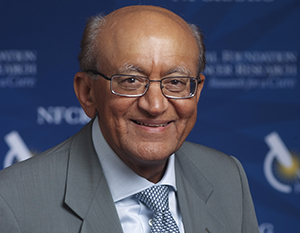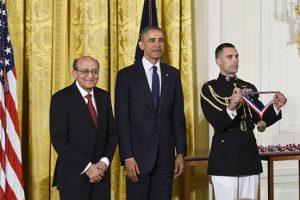Improving the Delivery and Efficacy of Anti-Cancer Therapeutics
In honor of National Medical Laboratory Professional Week, we’d like to highlight a few of the many accomplishments of NFCR-funded scientist, Dr. Rakesh Jain.
About Dr. Rakesh Jain

His work has also uncovered that the patients whose tumor blood flow increased in response to anti-angiogenesis therapy survived longer. Normalizing abnormal blood flow (known as vascular normalization) offers unprecedented opportunities to improve the treatment of cancer and various vascular disorders, including age-related macular degeneration—a leading cause of blindness.
Attacking the Deadliest Brain Cancer
Most recently, Dr. Jain has been studying the role angiogenesis plays in glioblastoma multiforme (GBM), the deadliest form of brain cancer. Dr. Jain’s research is helping doctors better tailor the use of anti-angiogenic therapies by identifying the characteristics that cause resistance to anti-angiogenic therapy for GBM patients. Dr. Jain and his team have identified molecular resistance pathways that may direct the development of new drugs that target these pathways and could extend the benefits of anti-angiogenic therapies for patients.
Because GBM invades healthy tissues near the tumor, Dr. Jain is currently testing inhibitors that could prevent invasion. Vessel co-option is a process by which cancer cells migrate through and around nearby healthy tissue. Dr. Jain is identifying genes and pathways that facilitate vessel co-option in order to prevent invasion and improve GBM therapies.
Elected to All 3 Branches of the National Academies













